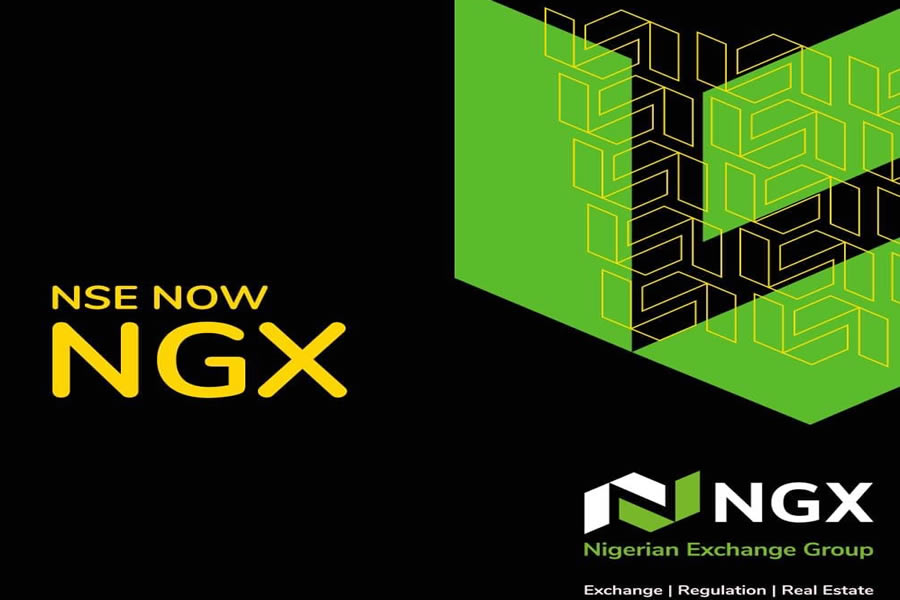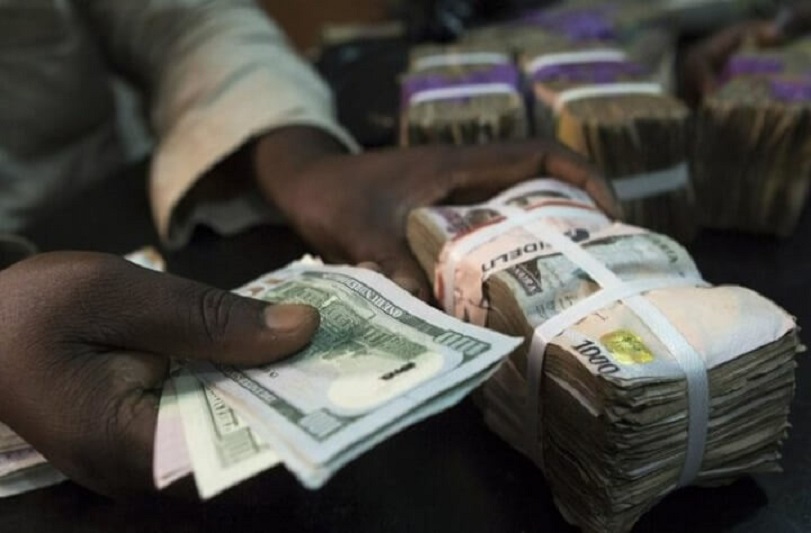Economy
Stock Exchange Extends Gains by N66bn

By Dipo Olowookere
Equities on the Nigerian Stock Exchange (NSE) further appreciated on Thursday by 0.51 percent on renewed buy interest in stocks across most sectors of the market.
Business Post reports that apart from the industrial goods index, which went down by 0.18 percent at the session, every other sector closed in green. The consumer goods index rose by 1.20 percent, the banking index by 1.10 percent, insurance index by 0.34 percent and the oil and gas benchmark by 0.15 percent.
At the close of transactions, the All-Share Index (ASI) improved by 135.8 points to 26,569.80 points to 26,434.00 points, while the market capitalisation increased by N66 billion to N12.824 trillion from N12.758 trillion.
Presco was the best performing stock at the market on Thursday, gaining N3.60 to close at N41.45 per unit, while Nigerian Breweries rose by N1.45 to finish at N52.70 per share.
GTBank appreciated by N1 to settle at N29 per unit, Dangote Sugar improved by 90 kobo to end at N16 per share, while Cadbury Nigeria increased by 85 kobo to trade at N9.90 per unit.
For the worst performing equity, this was Union Bank, which suffered a 30 kobo loss to close at N6.30 per share and was closely followed by Cutix, which fell by 14 kobo to finish at N1.35 per share.
Unilever Nigeria went down by 10 kobo to finish at N18.40 per unit, Lafarge Africa depreciated by 10 kobo to close at N13.50 per unit, while Neimeth declined by 7 kobo to end at 66 kobo per share.
A total of 319.7 million shares worth N3.1 billion were traded by investors on Thursday in 2,503 deals compared with the 180.2 million units valued at N3.0 billion transacted on Wednesday in 2,951 deals.
Union Diagnostic was the most traded stock at the market yesterday, transacting 187.0 million shares worth N41.1 million, while Fidelity Bank sold 19.8n million shares valued at N40.9 million.
Dangote Cement exchanged 12.3 million equities valued at N1.7 billion, Zenith Bank traded 10.9 million shares for N201.7 million, while UBA transacted 8.4 million units worth N57.4 million.
Economy
All-Share Index Rallies 0.25% as Seplat, Others Lead Gainers’ Chart

By Dipo Olowookere
The Nigerian Exchange (NGX) Limited almost succumbed to profit-taking on Thursday, but for Seplat, which pulled its string to salvage the situation.
Seplat triggered a buying interest in its shares after informing the investing public of its intention to release its full-year results for 2025 on February 26, 2026.
It almost singlehandedly lifted the energy index by 4.64 per cent yesterday. This sector was the only one of the five with green at the close of business.
The others were in red, with the insurance space down by 1.47 per cent, the industrial goods segment went down by 1.09 per cent, the banking index closed lower by 0.13 per cent, and the consumer goods sector shrank 0.04 per cent.
Analysis showed that the All-Share Index (ASI) soared on Thursday by 441.28 points to 178,625.63 points from 178,184.35 points, and the market capitalisation grew by N283 billion to N114.660 trillion from N114.377 trillion.
Business Post reports that 46 equities were in green during the session and 35 equities ended in red, implying a positive market breadth index and bullish investor sentiment.
The trio of Deap Capital, RT Briscoe, and Seplat gained 10.00 per cent each to settle at N8.69, N15.84, and N8,107.00 apiece, while Zichis rose by 9.97 per cent to N9.82, with ABC Transport surging by 9.91 per cent to N7.43.
On the flip side, NAHCO lost 9.98 per cent to trade at N148.45, Abbey Mortgage Bank depressed by 9.68 per cent to N11.20, Eterna gave up 9.50 per cent to close at N30.00, May and Baker depreciated by 9.19 per cent to N40.50, and Ecobank weakened by 8.72 per cent to N45.00.
Access Holdings was the most active stock yesterday with 52.1 million units sold for N1.3 billion, Zenith Bank exchanged 42.5 million units worth N3.3 billion, Tantalizers transacted 42.1 million units valued at N253.9 million, GTCO traded 40.8 million units worth N4.3 billion, and Deap Capital transacted 34.4 million units valued at N298.1 million.
When the closing gong was struck by 2:30 pm to signify the end of trading activity, investors had bought and sold 698.3 million shares worth N28.4 billion in 50,886 deals compared with 939.2 million shares valued at N34.0 billion exchanged in 61,279 deals a day earlier.
This showed that yesterday, the trading volume, value, and number of deals decreased by 25.65 per cent, 16.47 per cent, and 16.96 per cent, respectively.
Economy
Naira Corrects to N1,353/$1 at Official Market

By Adedapo Adesanya
The Naira depreciated against the United States Dollar by N4.71 or 0.35 per cent in the Nigerian Autonomous Foreign Exchange Market (NAFEX) on Thursday, February 12, to N1,353.66/$1 from the N1,348.95/$1 it was traded on Wednesday.
Similarly, it weakened against the Pound Sterling in the same market segment by N9.53 to settle at N1,849.64/£1 versus the previous day’s N1,840.11/£1 and lost N8.55 against the Euro to close at N1,608.68/€1 compared with the N1,600.13/€1 it was exchanged at midweek.
Also, at the GTBank FX section, the Nigerian Naira suffered a N1 loss against the US Dollar yesterday to quote at N1,359/$1, in contrast to Wednesday’s price of N1,358/$1, but closed flat in the parallel market at N1,430/$1.
The pullback witnessed by the Nigerian currency at the currency market on Thursday came as the market corrected from recent gains, with a further boost coming as the Central Bank of Nigeria (CBN) said all duly licensed Bureaux De Change (BDC) operators are permitted to purchase foreign exchange from the Nigerian FX market through any authorised dealer bank of their choice at prevailing market rates.
The move follows the apex bank confirmation in September 2025 that 82 BDC operators had been fully licensed under its revised regulatory framework, with operations commencing on November 27, 2025, as part of reforms aimed at formalising retail foreign exchange supply.
According to Mr Aminu Gwadabe, president of the Association of Bureaux De Change Operators of Nigeria (ABCON), there are expectations that the CBN’s move will help the Naira-US Dollar exchange value.
He noted that BDC operators have started approaching their banks to understand the operational modalities and framework for accessing dollars.
“We expect before the close of the week a comprehensive take-off of operations,” he added.
In the cryptocurrency market, Bitcoin has mostly erased its bounce from last week’s crypto crash, returning to the $66,000 area. It tumbled by 1.9 per cent to $66,161.78 yesterday.
The sell-off in digital assets tracked a broader pullback in the tech sector, particularly in the software names with which Bitcoin has been so strongly correlated.
Solana (SOL) dropped 2.4 per cent to sell for $77.68, Ripple (XRP) dipped 0.7 per cent to $1.36, and Ethereum (ETH) went down by 0.6 per cent to $1,938.96.
However, Cardano (ADA) added 1.7 per cent to trade at $0.2612, Dogecoin (DOGE) grew by 1.4 per cent to $0.0923, Litecoin (LTC) expanded by 0.6 per cent to $52.69, and Binance Coin (BNB) jumped 1.2 per cent to $610.55, while the US Dollar Tether (USDT) and the US Dollar Coin (USDC) closed flat at $1.00 each.
Economy
Crude Oil Market Falls on IEA Supply, Demand Forecast

By Adedapo Adesanya
The crude oil market dropped on Thursday due to falling demand, retreating fears of renewed Middle East conflict and expected increases in supply.
Brent crude traded at $67.52 a barrel after going down by $1.88 or 2.71 per cent, while the US West Texas Intermediate (WTI) crude finished at $62.84 a barrel, down $1.79 or 2.77 per cent.
The International Energy Agency (IEA) cut its demand growth outlook, a revision that landed in a market already uneasy about how quickly supply is said to be rising.
Selling accelerated after the Paris-based agency trimmed its 2026 global demand growth forecast to 850,000 barrels per day. A month ago, it was expecting 930,000 barrels per day.
The agency still sees global supply expanding by about 2.4 million barrels per day this year. The balance between supply and demand looks heavy, especially once winter disruptions unwind.
January tightened the market for a moment. Storms shut in more than 1 million barrels per day in North America. Kazakhstan, Russia, and Venezuela were dealing with outages of their own. Global supply fell by roughly 1.2 million barrels per day, but it appears that those barrels are now starting to return.
On its part, the Organisation of the Petroleum Exporting Countries (OPEC) is projecting much stronger demand growth, above 1.4 million barrels per day.
Crude oil production from the OPEC+ alliance slumped by as much as 439,000 barrels per day in January compared to December as a major supply disruption in Kazakhstan added to lower output from Iran and Venezuela, OPEC data showed in its Monthly Oil Market Report (MOMR).
The unplanned outages and lower production could ease to some extent the fears of oversupply that have been weighing on oil prices.
On the geopolitical front, Prime Minister of Israel, Mr Benjamin Netanyahu, said as he was departing the US, noting that President Donald Trump appeared to be framing a resolution to the conflict with Iran over nuclear weapons.
On Wednesday, the American President said after talks with PM Netanyahu that they had yet to reach a definitive agreement on how to move forward with Iran, but that negotiations with Tehran would continue.
Earlier this week, President Trump said on Tuesday that he was considering sending a second aircraft carrier to the Middle East if a deal is not reached with Iran. The date and venue of the next round of talks have yet to be announced.
-

 Feature/OPED6 years ago
Feature/OPED6 years agoDavos was Different this year
-
Travel/Tourism10 years ago
Lagos Seals Western Lodge Hotel In Ikorodu
-

 Showbiz3 years ago
Showbiz3 years agoEstranged Lover Releases Videos of Empress Njamah Bathing
-

 Banking8 years ago
Banking8 years agoSort Codes of GTBank Branches in Nigeria
-

 Economy3 years ago
Economy3 years agoSubsidy Removal: CNG at N130 Per Litre Cheaper Than Petrol—IPMAN
-

 Banking3 years ago
Banking3 years agoSort Codes of UBA Branches in Nigeria
-

 Banking3 years ago
Banking3 years agoFirst Bank Announces Planned Downtime
-

 Sports3 years ago
Sports3 years agoHighest Paid Nigerian Footballer – How Much Do Nigerian Footballers Earn











